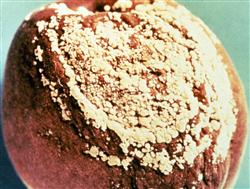
Become Skilled at Diagnosing and Understanding Plant Diseases
Plant production is reduced significantly every year, due to pathological problems. To control these problems is to increase productivity, and for the horticultural business; that means increased profit margins.
PLANT PATHOLOGY IS NOT simply a study of pests & diseases. Some pests are in fact not pathological problems, and there are pathological problems which are not pests or diseases.
PLANT PATHOLOGY is about problems in plants caused by physiological damage or irritation at a cellular level. It is concerned with problems which affect parts of the plant cell, leading to malfunctions in the normal processes which occur.
This course is a must for horticulturalists who want to boost their plant health knowledge and prevent damage by pests and diseases in different settings (gardens, nurseries, parks, public landscapes, farms, market gardens).
Lesson Structure
There are 8 lessons in this course:
-
Introduction
-
Overview of plant disease
-
Diagnosis of problems: nutritional, environmental, pathological
-
Symptoms
-
Common terminology
-
Types of Diseases
-
Morphological changes
-
Necroses
-
Hypoplases
-
Hyperplases
-
Types of pathogens: viruses, bacteria, actinomycetes, fungi, nematodes
-
Techniques for diagnosing plant diseases: optical equipment, preparing pathogens for observation, culture methods, inoculation, etc
-
Plant viruses; detection and diagnosis
-
Plant nematodes
-
Case study: Australian plant nematodes
-
Main types of diseases
-
Spots
-
Rots
-
Cankers
-
Galls
-
Mildews
-
Rusts
-
Moulds
-
Wilts
-
Scabs
-
Others
-
Using a key to diagnose diseases in plants
-
The Lifecycle of a Disease
-
Inoculation
-
Penetration
-
Infection
-
Growth and reproduction
-
Dissemination
-
Methods of penetration by bacteria and nematodes
-
Lifecycle of nematodes
-
Fungal biology
-
Role of insect spreading fungal and bacterial pathogens
-
Control Techniques
-
Sanitation
-
Resistant Plant Varieties
-
Biological Controls
-
Soil Drenches/dips
-
Chemical Controls
-
Nematicides
-
Soil fumigants
-
Contact poisons
-
Fungicides and the environment
-
Systemic fungicides
-
Misters, dusters, blowers, sprayersSpray maintenance and cleaning
-
Natural controls: cultural, physical, biological, etc
-
Terminology
-
Selected Pathogen Diseases Ornamentals
-
Fungi affecting turf
-
Phytopthera cinnamomi
-
The process of tree decay: Shigo
-
Case study: how phytopthera cinnamomi kills a susceptible Eucalyptus
-
Peach powdery mildew
-
Rose powdery mildew
-
Honey fungus on rhododendrons and azaleas
-
Petal blight on rhododendrons and azaleas
-
Selected Pathogen Diseases Crops
-
Sclerotinia rot in vegetables
-
Nematodes and citrus production
-
Citrus diseases: scaly butt, lemon crinkle, citrus canker
-
Brown rot
-
Fire blight
-
Apple fruit rot caused by trichoderma harzianum
-
Prunus necrotic ringspot virus in cut flower roses
-
Potato and tomato blight
-
Club root
-
Non-Infectious Diseases
-
Nutritional disorders
-
Lack of water
-
Excess water
-
Other environmental problems
-
Disorders caused by man: mechanical damage, pollution
-
Case Study: Air pollution
-
Other disorders: genetic, disturbed growth
-
Non parasitic turf problems
-
Special Project
Aims
-
Describe a range of pathological problems that affect plants.
-
Describe symptoms of a range of diseases that affect plants.
-
Describe disease life cycles and explain how this knowledge can be applied in disease control
-
Explain the methods used to control diseases
-
Demonstrate a comprehensive knowledge of a particular plant pathogen.
-
Identify and describe a range of non-infectious diseases and problems that affect plants
-
Identify and describe a range of common pathogens that affect ornamental plants.
-
Identify and describe a range of common pathogens that affect crop plants
WHO IS THIS COURSE FOR?
This course is ideally suited to people working in, or aspiring to work in:
- Horticultural science
- Horticulture research
- Agronomy
- Horticultural consultation
- Teaching
- Crop growing
- Fruit & vegetables
- Botanic gardens
- Parks & gardens
- Garden maintenance
